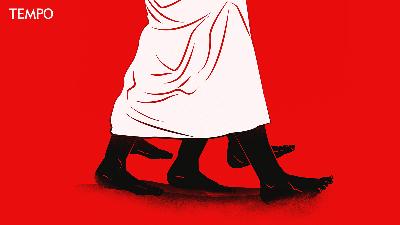Suffering Because of the New Capital
The construction of the new capital (IKN) resulted in environmental damage and health problems in other regions. It should be halted.
Tempo
July 15, 2024

PRESIDENT Joko Widodo was right when he decided to spend his retirement years at his home in Karanganyar, Central Java. This house, gifted to him by the state, is strategically located because it is close to public transportation, such as Adi Soemarno Airport; a train station, which has trains to Jakarta, Solo and Bandung; and the Surabaya toll road that reaches to Jakarta.
Imagine if Jokowi had decided to live in the Nusantara Capital City (IKN) in East Kalimantan. He would have a difficult retirement in a new city not yet suitable for habitation because of the lack of facilities. Even the airport is not yet ready, despite this being needed for the August 17 Independence Day ceremony. Heavy rain has delayed construction because the soil has turned into mud, and a huge tent has had to be erected to allow the runway to be surfaced.
The construction of the new capital is proving to be very expensive because the materials have to be brought in from other islands, such as Java and Sulawesi. Even sand and rocks have to be transported from Central Sulawesi. According to an agreement between the governors of Central Sulawesi and East Kalimantan in 2021, the IKN will require 30 million tons of rocks for the construction of infrastructure. As a result, there has been massive extraction of stone in a number of locations in Central Sulawesi, such as Palu, Donggala and Sigi.
The sand and rock excavation has resulted in a decline in the quality of life and environmental damage in the mining areas. Dust covers the countryside and the surface of Trans Palu-Donggala highway, forcing people to seal their homes. In the road, drivers need to wear thick masks and goggles.
As well as this, the number of people suffering from acute respiratory tract infections is soaring, especially in Palu. A public health center in Palu has recorded a sharp increase in the number of infections from a previous annual figure of only around 800 to 3,000 per year in the last two years.
This is an irony for the IKN, which Jokowi has been boasting will be a smart future forest city. It is claimed that the city will be smart and environmentally friendly, with low carbon emissions. The plan is that 75 percent of the land will be green space and that 100 percent of its energy needs will be supplied by renewable energy, such as solar and wind power. In order to build all these facilities, the IKN has damaged the environment in other regions, and has also had an impact on the health of the people living there.
It is becoming increasingly clear that it is not right to refer to the IKN as an environmentally friendly city because it is being constructed from materials that cause severe environmental damage. This magazine has repeatedly warned that building the IKN is simply the wrong thing to do. The plan to build it is only aimed at achieving Jokowi’s ambition of leaving behind a monumental legacy from his administration. There was no satisfactory feasibility study for the IKN. And there was no meaningful public dialogue about the plan.
The construction has already drained and will continue to drain state funds, while the Jokowi administration’s promise to attract investors has not been kept. What kind of investor wants to put their money in a land that does not even have enough rocks or gravel to build a house?
Once again, the construction of the Nusantara Capital City must be halted before there is worsening environmental damage in other regions. President-elect Prabowo Subianto could stop it for the sake of public safety and the health of state finances.

